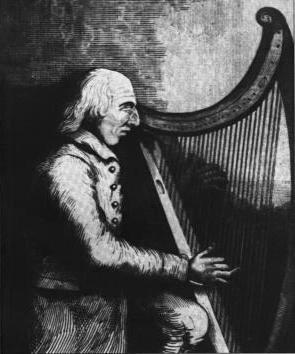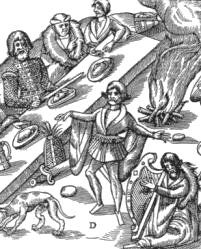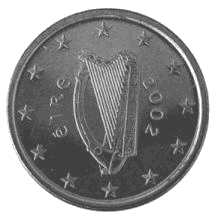FolkWorld
Article by Arthur O'Neill (compiled by
Walkin' T:-)M)
The Granard Harp Festival
Excerpts from `The Memoirs of Arthur O'Neill' (1810)
`The Memoirs of Arthur O'Neill' have been written down about the year 1810 for the traditional Irish music collector Edward Bunting,
and O'Sullivan included it in his Carolan manuscript (->
FW#20).
Arthur O'Neill (1734-1818) was born in Drumnastrade near Dungannon, Co. Tyrone.
At the age of two he diverted himself with a knife and eventually lost his
sight. As many blind he was taught the harp and became an accomplished
itinerant harper. In 1760 O'Neill strung Brian Boru's Harp (->
FW#23)
and played it in a procession down the streets of Limerick. He gained
2nd prize at each of the three Harp Festivals held at Granard, Co. Longford,
in 1781, 1782 and 1785. Arthur O'Neill also attended
the Belfast Harp Festival in 1792 and gave Bunting a large number of airs.
At the time I heard of the first Ball in Granard I was at my brother Ferdinand's
in Glenart [near Caledon in the County of Tyrone],  from whence I pushed towards the County of Longford without meeting anything
particular, only touching at some of the gentlemen's houses in my way and met
Patrick Carr going to Granard also. I remained in and about Granard for near
a month before the first Ball.
from whence I pushed towards the County of Longford without meeting anything
particular, only touching at some of the gentlemen's houses in my way and met
Patrick Carr going to Granard also. I remained in and about Granard for near
a month before the first Ball.
These annual Balls originated in the following manner. A Mr. James
Dungan, a native of Granard and a very extensive merchant at that
time residing in Copenhagen in Denmark, heard in some manner that
the gentlemen of Scotland encouraged annual meetings or competitions
amongst Highland pipers, where premiums were awarded to the best
performers. Dungan by national ardour, in order to retain and
support the original instrument of his own country, wrote to his
friends in and about Granard and remitted a sufficient sum to
defray the expense of the three celebrated Balls held at Granard
in the years of (to the best of my recollection) 1781, 1782 and
1783 [1785].
`And it's to be lamented', says Dungan in his letter to his friends,
that persons placed in high situations, and who have it in their
power to do the most good by their rank or wealth for their own
country are, I am sorry to hear, the least disposed to do it - I
will not attempt to say whether by habit or inclination. I am
informed they know nothing of Irish music or Irish misery only
by the name, so great are their desires to support and promote
modern English music. And I consider my native land half a century
behind Scotland in encouraging and rewarding their best performers
on the bagpipe, which if preferred to the wired harp, strongly
evinces our taste. The Welsh harp is increasing, the Scotch bagpipes
are increasing, but poor Erin's harp is decreasing. If I was among
you it should not be the case. Farewell, my friends, and I hope
you will amongst yourselves support what I make bold to dictate
to you.
P.S. Why not make or establish a fund for the above purpose? I
don't want you to imitate the Scotch but the ancient Irish. Adieu.
Copenhagen, March, 178-.'
First Ball. Harpers present:
| Charles Fanning | Rose Mooney |
| Arthur O'Neill | Charley Berreen |
| Paddy Carr | and |
| Paddy Maguire | Hugh Higgins. |
 All
played their best tunes. Charles Fanning got the first for the `Cúilfhionn'
(ten guineas). I got the second for `The Green Woods of Truagh' and `Mrs.
Crofton' (eight guineas) and Rose Mooney got the third for `Planxty Burke'
(five guineas).
All
played their best tunes. Charles Fanning got the first for the `Cúilfhionn'
(ten guineas). I got the second for `The Green Woods of Truagh' and `Mrs.
Crofton' (eight guineas) and Rose Mooney got the third for `Planxty Burke'
(five guineas).
The judges on this first Ball were excellent and there was some deliberation
about the first premium between Fanning and me. But in consequence of my endeavouring
to appear on the occasion in my best duds they decided in favour of Charley,
who was careless in his dress, saying at the same time he wanted money more
than I did. However, I received many handsome verbal compliments besides the
eight guinea premium. To the best of my information there were at least five
hundred persons at the Ball, which was held in the market house of Granard.
A Mr. Alexander Burrowes was one of the stewards, who was a tolerable judge
of music and who was so angry on the decision of premiums that he thrust his
cane through one of the windows. Mr. Patrick Reilly, the innkeeper, prepared
the supper.
After this first Ball was ended I became a favourite in and about
Granard, where I remained about four months, where my company
was much sought for. [...]
Second Ball. Harpers present:
| Charles Fanning | Hugh Higgins |
| Arthur O'Neill | Rose Mooney |
| Paddy Carr | Ned MacDermot Roe |
| Paddy Maguire | and |
| Charley Berreen | Kate Martin. |
All played their best tunes as usual, but the premiums were reduced
this year to eight guineas the first, the second premium six guineas
and the third four guineas. Charles Fanning got the first for
the `Cúilfhionn' again. I got the second for `The Green Woods of Truagh' and `The Fairy Queen'.
Rose Mooney got the third, but I don't remember for what tunes.
Higgins got some way huffed and retired without playing a single
tune. A Major Smith who knew nothing about music was appointed
one of the judges [and he] declared, `By God, they made me a judge
because they knew I knew nothing about it!' [...]
After remaining with my friends in and about the County Tyrone
in the usual manner for about nine months, I then began to prepare
myself for the third Granard Ball. I set out accordingly and touched
or stopped at almost every house mentioned in going to the first
and second Ball, without meeting anything particular worthy of
notice, until I got to Mr. James O'Reilly's of Higginstown, County
Longford, with whom I remained until the Ball, on which the following
harpers attended :
| Charles Fanning | Charley Berreen |
| Arthur O'Neill | Paddy Carr |
| Hugh Higgins | Ned MacDermot Roe |
| Laurence Keane | Rose Mooney and her maid Mary |
| James Duncan | Kate Martin. |
The premiums were the same as the second Ball, that is, eight
guineas the first, six the second and four the third. Fanning
(deservedly) always got the first. I got the second, and poor
Rose Mooney got the third as usual. A gentleman named Miles Keane
railed uncommonly about the distribution of the premiums and swore
a great oath that it was the most nefarious decision he ever witnessed.
I don't know what he meant but heard the expression. Lord and
Lady Longford attended this Ball and the meeting was vastly more
numerous than at the two former Balls. Quality forty miles around
attended and there was not a house in the town but was filled
with ladies and gentlemen, and the town was like a horse fair
as there was no stabling for the twentieth part that came. There
were at least a thousand people at the Ball. In consequence of
the harpers who obtained no premiums being formerly neglected,
I proposed a subscription, which was well received and performed,
and indeed on distributing the collection their proportions exceeded
our premiums. This last Ball was chiefly spoiled by means of a
Bernard Reilly of Ballymorris, who entertained some antipathy
to Mr. Dungan and took every pains to destroy the harmony of the
Ball.
Mr. Dungan, the father and promoter of these three Balls, came over from Copenhagen
chiefly (amongst other business) to see how this third and last Ball was conducted
; and he got so much disgusted with indecorous manners of the stewards and others
who superintended  the management of it that Mr. Dungan would not attend during the performance,
but attended at supper. There was a very handsome ode composed for Mr. Dungan
on his arrival at Granard, but through jealousy or some other motives he never
saw either the ode or the composer.
the management of it that Mr. Dungan would not attend during the performance,
but attended at supper. There was a very handsome ode composed for Mr. Dungan
on his arrival at Granard, but through jealousy or some other motives he never
saw either the ode or the composer.
I dined with Mr. Dungan the day after the Ball at the Widow Reilly's
in Granard and I cannot account how I deserved his attention,
but I should sit next to him and dined with him in different places.
He acquired admiration everywhere he visited in consequence of
his polished manner and gentlemanly accomplishments. He remained
some time in and about Granard and I understand he is now alive
and well in Copenhagen. If there was a Dungan and a Bunting in
each province in this Kingdom, it's more easily imagined than
my poor abilities can describe to what a stage of grandeur the
Irish harp and the music incident to it would arrive to.
When the third Ball was over I took my leave of Duncan and Keane
(two of the harpers). But I forgot to mention that before the
Ball opened Rose Mooney pledged her harp, her petticoat and her
cloak. When I make this remark of poor Rose, the faults or ludicrous
remarks I make use of respecting her own conduct should be entirely
attributed to her maid Mary, whose uncommon desire for drinking
was unlimited, and taking advantage of her mistress's blindness
she always when money was wanting pawned any article on which
she could raise half a pint. Therefore, poor Rose, I acquit you
of any meanness on your own account, as your guides and mine have
led us into hobbles which we poor blind harpers have to get out
of and afterwards laugh at. But we in general think that it's
better for people in every situation in life to have about them
the rogue they know than the rogue they don't know.
I made it a point to remain in and about Granard till I understood
that Mr. Dungan was for returning to Copenhagen, and it may be
imagined that I say too much of myself. He took me aside and exchanged
mutual friendship on parting, and when done shaking hands I discovered
the weight of six guineas in mine, adding that I deserved the
first premium (as he was informed, not attending) and hoped that
I would not be offended at his making it superior to Fanning's. [...]
20-27 April 2003 Granard Traditional Harp School (granard.harp.net)
Two hundred years later in 1981 a committee was set up in Granard to
re-establish the competitions which are still on going to-day with
competitors coming from all over Ireland, Europe and the USA. In
keeping with the original festival it also gives large money prizes
to reward the modern day harpers.
In 1981 the first winner of the top prize was Ms Anne Heyman, USA
(-> FW#17)
and in 2002 the winner was Fionnuala Ni Ruanaidh, Monaghan.
The present committee have re-established the Harp School, employing
top class and well known teachers. The aims are the same as those of
John Dungan back in 1781 - to promote the Irish Harp and Harp music.
9-11 May 2003 Edward Bunting Harp and Singing Festival
Edward Bunting (1773-1843) of Armagh was engaged at the Belfast Harp
Festival in 1792 to note down the music of the last of the itinerant Irish
harpers. Entranced by the music, Bunting made the collection, arrangement and
publication of traditional music his lifework. The Edward Bunting Concert
series lasts over a six-month period November 2002 to April 2003 in Markethill,
Co. Armagh, and culminates in The 5th Edward Bunting Harp and Singing Festival
in May 2003 in the newly opened Armagh City Hotel. The major aim is to arouse
awareness and generate an interest in the existing harp music, instrumental
dance music and song.
The Memoirs of Arthur O'Neill
Co. Longford / Granard
Harp.net
Zum Inhalt der FolkWorld Beiträge
Zum Inhalt der FolkWorld Nr. 25
© The Mollis - Editors
of FolkWorld; Published May 2003
All material published in FolkWorld is © The
Author via FolkWorld. Storage for private use is allowed and welcome. Reviews
and extracts of up to 200 words may be freely quoted and reproduced, if source
and author are acknowledged. For any other reproduction please ask the Editors
for permission. Although any external links from FolkWorld are chosen with greatest
care, FolkWorld and its editors do not take any responsibility for the content
of the linked external websites.
FolkWorld - Home of European Music

 from whence I pushed towards the County of Longford without meeting anything
particular, only touching at some of the gentlemen's houses in my way and met
Patrick Carr going to Granard also. I remained in and about Granard for near
a month before the first Ball.
from whence I pushed towards the County of Longford without meeting anything
particular, only touching at some of the gentlemen's houses in my way and met
Patrick Carr going to Granard also. I remained in and about Granard for near
a month before the first Ball.
 All
played their best tunes. Charles Fanning got the first for the `Cúilfhionn'
(ten guineas). I got the second for `The Green Woods of Truagh' and `Mrs.
Crofton' (eight guineas) and Rose Mooney got the third for `Planxty Burke'
(five guineas).
All
played their best tunes. Charles Fanning got the first for the `Cúilfhionn'
(ten guineas). I got the second for `The Green Woods of Truagh' and `Mrs.
Crofton' (eight guineas) and Rose Mooney got the third for `Planxty Burke'
(five guineas).
 the management of it that Mr. Dungan would not attend during the performance,
but attended at supper. There was a very handsome ode composed for Mr. Dungan
on his arrival at Granard, but through jealousy or some other motives he never
saw either the ode or the composer.
the management of it that Mr. Dungan would not attend during the performance,
but attended at supper. There was a very handsome ode composed for Mr. Dungan
on his arrival at Granard, but through jealousy or some other motives he never
saw either the ode or the composer.
